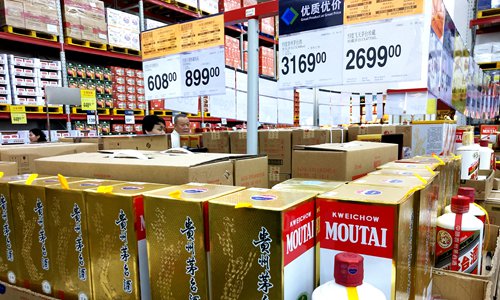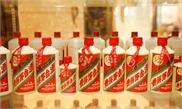
Bottles of Moutai liquor on sale at a supermarket in Shenzhen, South China's Guangdong Province, in January. Photo: IC
Maotai, a small town in Southwest China's Guizhou Province, welcomed its busiest time of the year when the Chinese state-owned distillery giant Kweichow Moutai held its annual shareholders' meeting.
This year's gathering, which was held on May 29 and came days after the arrest of its former chairman over graft accusation, was particularity in the limelight.
Yuan Renguo, its chairman from 2011 to 2018, was arrested on May 22 for taking massive bribes. Yuan "severely violated political discipline and rules, and used dealership qualification of the Moutai liquor as tools of strings pulling and exchange of interests," said the Central Commission for Discipline Inspection (CCDI).
A few days after Yuan's arrest, the head of the company's e-commerce division Nie Yong was also arrested on similar charges. Nie was accused of taking bribes from officials looking to get into the lucrative Moutai distribution business.
A reshuffle of the company's top leadership attracted more than 4,500 shareholders to come for the meeting this year, almost 10 times the number when compared with the 500 that attended last year, and filling nearly all the local hotels in the small town. The town only has a registered population of 50,000.
In order to host such a large and unexpected number of attendees, the company had to add a temporarily venue one day before the meeting, but still only half of the shareholders could be accommodated and the rest watched the meeting on a big screen.
The shareholders are rather keen to know where the anti-corruption reform led by chairman Li Baofang, Yuan's successor, will lead to, and whether the company's profits will be evenly distributed under the new leadership.
Lucrative business
Taking the name from its hometown of Maotai, Kweichow Moutai produces a grain alcohol called "baijiu." The firm, currently valued at around $165 billion, overtook British giant Diageo as the world's largest liquor group by market capitalization in 2017.
Moutai, which sells some of its flagship products for close to $250 per bottle, is often served at domestic banquets and high-level business dinners, and is also considered as a respectable gift needed to establish a relationship. It is not only popular among consumers but also coveted by collectors for its potential appreciation.
The luxury beverage is sold through designated distributors, who need licenses granted by Moutai to be able to sell it. The profitable Moutai business has become a way for many top Moutai executives to establish relationships with local government officials. According to industry insiders, it has become an open secret that government officials would call on senior figures - such as Yuan and Nie - in the company, develop favorable relationships, often through bribes, in a bid to secure a distribution license.
It is widely believed that Yuan's arrest is related to Wang Xiaoguang, the former vice governor of Guizhou, who was sentenced to 20 years in prison for graft in April. According to several industry insiders in the town of Maotai, Yuan, as the company's chairman, approved several Moutai distribution businesses for Wang and gave him extra selling quotas.
"Distribution quotas are tightly controlled. Unlike distributors who only have a quota of two to five tons per year, some officials like Wang could start with 10 tons or even 100 tons directly," a person close to top executives of the company said.
Yuan and Nie are not rare cases, they are in fact among several senior figures in the company that have been arrested for corruption. Deputy general manager Tan Dinghua was arrested in 2016 after receiving 34.6 million yuan in property in exchange for helping more than 10 companies become distributors. In 2014, deputy secretary Fang Guoxing was arrested for managing several illicit distribution companies registered in the names of his family members, and former general manager Qiao Hong was arrested for corruption in 2007.
How profitable is Moutai's distribution business?
Take its well-known flagship 500-milliliter bottle of Feitian Moutai, its official factory price is 969 yuan ($140.6), yet its market price reached over 2,100 yuan in the first quarter of 2019.
In previous years, when the factory price was 819 yuan or even 619 yuan, its market price also exceeded 2,000 yuan, a profit of almost 200 percent per bottle.
When the market is at its best, Moutai dealers can make a gross profit of 3 million to 4 million yuan per ton. Even when the company raised its factory price by 18 percent in 2018, a gross profit of about 2 million yuan per ton could still be achieved.
Moreover, though getting a license is not cheap - around 10 or 20 million yuan, a person in charge of a small liquor company in Maotai town said that distributors could make back the license fee within one or two years, and after that, "you can just lie on the bed and wait for the money come in."
Radical reform
Since taking over Yuan's place in May last year, Li has launched broad anti-corruption reforms in the company, starting with Moutai's core lucrative distribution system.
Li has cancelled over 476 distributors' licenses, taken back 6,000 tons of Moutai sales quotas, which accounts for over 10 percent of its annual production ability. Meanwhile, the company also set up its own sales network on May 5, making investors worry that it might reduce their profits in the future.
A source familiar with the company's dealership system told Caixin that types of dealers were targeted in the crackdown including those designated by former company executives and those controlled by company employees.
The company also set up a new registration system - Moutai's leadership now has to register all their communications with public officials interested or involved in Moutai's retail business - to ensure the distribution businesses conducted by top executives are well monitored.
Moreover, Li vowed to increase its flagship liquor production to 56,000 tons, with the completion of the plant's expansion project in 2020. Last year, the production output of the alcohol was nearly 50,000 tons.
Li said that the company will also increase the production output of Moutai's sub-brand series to 56,000 tons in 2021, after the other expansion project has been completed.
Hard to move
Yet insiders cautioned that the graft under Moutai's distribution system might be hard to contain. The company is facing a dilemma, "it can't move, and doesn't dare move," sources told Caixin.
Many major dealers have strong political support. An employee who has worked for the company for a long time told Caixin that "many provincial agents and municipal distributors have high-level political backgrounds, such as central officials, senior military officers, or are relatives and friends of provincial leaders; and Moutai can't take action against them."
Many insiders close to the company also said that after the company conducted several internal investigations, it found so many illegal distribution deals that it might not be willing to make all of them public.
Apart from the complicated graft situation within its distribution system, Moutai also faces problems such as fake products, a long-time headache to the company.
In January, six people were detained in Guizhou for making and selling fake Moutai.
The suspects allegedly bought cheaper liquor at 50 to 300 yuan per 500 ml and sold it for 300 to 4,000 yuan per bottle (500 ml) to markets in Beijing and South China's Guangdong Province after repackaging it with fake logos, according to a Xinhua report.
The police confiscated liquor and equipment worth 20 million yuan, including 3,990 bottles of fake Moutai and 3,500 bottles of other fake brands.
Despite the tough work ahead, during the annual shareholders' meeting, Li still managed to strike an optimistic tone about the company's future development, eyeing a growth target of 14 percent in 2019.
In the first three months of 2019, the Chinese distiller posted stronger than expected preliminary profits.
The company's net profits in the first quarter rose to 11 billion yuan, while its sales revenues reached 25.7 billion yuan during the same period, up 21 percent year-on-year.
The company posted a 30 percent rise in its 2018 profit, marking a second consecutive double-digit annual profit growth.
The story is based on reports from Caixin

